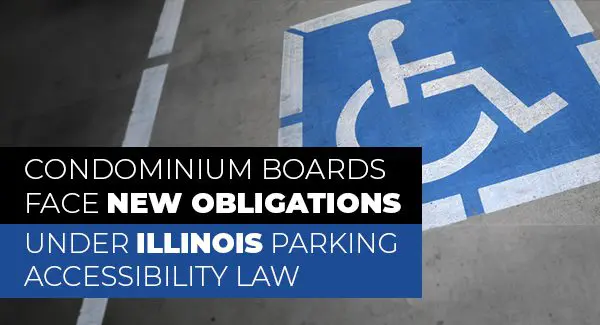- Community Associations, Legal Updates, Board Member 101
- Illinois
On August 9, 2024, Governor Pritzker signed SB 2740 into law. The Bill creates a new Section 18.12 of the Illinois Condominium Property Act (the “Act”) that will be effective January 1, 2025. This update to the ICPA addresses accessible parking for individuals with disabilities within condominium associations.
Below are four key points of this new legislation.
1. Mandatory Accessible Parking Policies
Illinois condominium associations with parking facilities are required to adopt a written policy and procedure to accommodate requests for accessible parking from disabled owners.
This update to the Act requires that the time for review of a disabled owner’s request be not more than 45 days from the date the request is submitted and that the board decide on whether to grant the request within a “reasonable period of time.” Copies of the policy adopted by the board must also be given to any owner upon request.
Further, the policy must be adopted by the board by no later than April 1, 2025.
2. Prioritization for Disabled Owners
In cases where accessible parking spaces are common elements or leased by the association, the policy must give disabled owners priority over non-disabled owners for the use of these spaces.
If a non-disabled owner is using an accessible space, they must relinquish it when a disabled owner’s request is approved.
3. Handling Deeded and Limited Common Element Spaces
For accessible spaces that are either deeded or limited common elements, disabled owners can request to exchange their standard parking space for an accessible one. The board is required to make reasonable efforts to facilitate such exchanges.
For example, the new law stipulates that regardless of having invested $100,000 in securing a prime parking space as a limited common element, an owner could still be compelled to relinquish it.
As most condominium associations will be confronted with this issue, legal counsel is essential to navigate this challenging and controversial requirement of this new Illinois law.
4. New Construction and Conversions
For new or converted condominiums, all accessible parking spaces must remain common elements. This means the accessible parking spaces cannot be sold as deeded spaces or limited common elements. This aims to prevent conflicts and ensure that accessible spaces are available to those who need them.
If a developer fails to comply with these updated requirements to the Illinois Condominium Property Act, affected parties (including unit owners and the board), can pursue legal action for damages and equitable relief.
You can read the full legislation here: https://www.ilga.gov/legislation/publicacts/fulltext.asp?Name=103-0916
Legal Resource
The new Section 18.12 of the Illinois Condominium Property Act introduces critical changes that require condominium board members to prioritize and accommodate the parking needs of disabled owners. Compliance with this law is not only a legal obligation but also essential for ensuring fair and accessible living environments within condominium communities.
Board members must act promptly to adopt the required policies and procedures to avoid legal repercussions and to support the rights of all residents.
Do not hesitate to contact our law firm if KSN can assist your Illinois community association in reviewing, drafting, or revising your association’s parking policy to comply with this new legal update. KSN attorneys can also assist with owner requests for parking access and any disputes that may arise.
Please call 855-537-0500 or visit www.ksnlaw.com.
Since 1983, KSN has been a legal resource for condominium, homeowner, and townhome associations. Additionally, we represent clients in real estate transactions, collections, landlord/tenant issues, and property tax appeals. We represent thousands of clients and community associations throughout the US with offices in several states including Florida, Illinois, Indiana, and Wisconsin.
Please note the material contained in this article is for educational and informational purposes only and does not constitute legal advice. No attorney-client relationship is established by your review or receipt of the information contained in this article. You should not act on the information discussed in this article without first obtaining legal advice from an attorney duly licensed to practice law in your State. While KSN has made every effort to include up-to-date information in this article, the law can change quickly. Accordingly, please understand that information discussed in this article may not yet reflect the most recent legal developments. Material is not guaranteed to be correct, complete, or up to date. KSN reserves the right to revise or update the information and statements of law discussed in the article law at any time, without notice, and disclaims any liability for your use of information or statements of law discussed on the article, or the accessibility of the article generally. This article may be considered advertising in some jurisdictions under applicable law/s and/or ethical rules/regulations. © 2024 Kovitz Shifrin Nesbit, A Professional Corporation.


